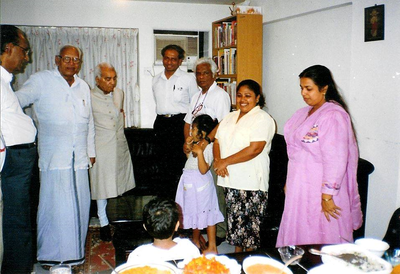ASIA / INDIA: Justice V.R. Krishna Iyer’s legacy, an inspiration for generations to come
by Basil Fernando
All Indians owe a debt of gratitude to Justice V.R. Krishna Iyer, a great man, who passed away on 4th December 2014, shortly after his hundredth birthday. He stood up against the might of the powers of the day with firm determination to save his country and its freedoms.
When Justice Krishna Iyer delivered his landmark judgment to Maneka Gandhi’s petition against an order issued by a regional passport officer in New Delhi, in which she was asked to surrender her passport, he not only transformed judicial attitude towards the safeguarding of personal liberty during the horrible experiences of the infamous 1975 national emergency, he also saved Indian democracy.
After his retirement, talking informally about this case, he told me the following story:
As a Supreme Court judge in India he visited the United States and met special prosecutor Archibald Cox, who was then leading the inquiry into what came to be known as the Watergate Scandal, which later led to the resignation of President Nixon from his office. During his conversation with Archibald Cox, he was struck by Cox’s firm assertion that “I will not let this man, [President Nixon] destroy my country”. When considering Maneka Gandhi’s case, he spoke the same words to himself. And, indeed, he saved India from the threat to its democracy posed by Mrs. Indira Gandhi.
Justice Krishna Iyer also recalled during our conversation how he was informed that, on the date of the hearing of the Maneka Gandhi case in Court, during the noon break for lunch, crowds loyal to Mrs. Indira Gandhi were supposed to gather in the Court premises. In order to prevent disruption of the hearing, that morning, he told the lawyers appearing in the case that he would forgo lunch and hear the case to its end. As expected, the lawyers also agreed to forgo their lunch and complete the proceedings. After hearing the case, he disappeared with his stenographer for several days. When he appeared again in Court, the Judgment had already been drafted and a large number of copies had been made. These were precautions he had taken, in order to avoid any disruptive attempts to prevent the final judgment from being delivered.
Justice Krishna Iyer’s passion for human rights is quite well known in India as well as abroad. What is perhaps not understood as well is that his understanding of patriotism was inseparable from the commitment to safeguard the freedoms of all people.

Justice Krishna Iyer in Hong Kong in 1996. From the left, Mr. V.I Itty, Justice Krishna Iyer, Justice Rajendra Sachar, the then President of PUCL, Mr. Shanta Fernando ( YMCA Asian Alliance Secretary at that time), Basil Fernando, Director of AHRC, Jessica Fernando, Jacinta Fernando Gigi Mathews and Roopa. Photo: Mathews George Chunakara
Justice Krishna Iyer was a great legal philosopher. In all his judgments, as well as in his public interventions, which continued even after his retirement as a judge, till the very end of his long life, he tried to give expression to an understanding of freedom that is inseparable from addressing inequalities experienced by people in India. Upliftment of the poor and ending of inequalities were the great aspirations that always informed his thought processes and expressions.
I had the privilege of knowing him and associating with him closely from the mid-1990s; the last time I met with him was at his residence in Kochi in the year 2012. In our last meeting, he inscribed in a copy of one his books the words: “just man in an out of courts”. Without doubt, the search for justice was his life’s ambition and he was faithful to this mission to the very end.
He took a great interest in the drafting of “A People’s Charter – The Asian Human Rights Charter”, which was launched on 17th May 1998 at Kwangju, South Korea. He attended the first preparatory meeting for the drafting of this Charter in Sri Lanka, and was a member of the drafting committee, together with Professor Yash Ghai and former retired Chief Justice of India Justice P.N. Bhagwati. Justice Krishna Iyer participated in the launching of the Charter at Kwangju during the celebrations of the Kwangju uprising.
He attended many other meetings organized by the Asian Human Rights Commission; some of these meetings were organized in association with the Vigil India movement, of which he was a great supporter and promoter. He also took pleasure in attending a meeting with a number of Chinese lawyers and judges organized by the Asian Human Rights Commission in Bangkok, Thailand.
He was daring in the face of challenges, making justice possible in circumstances where it appeared to be an impossible goal. He was a visionary who lived to make freedom and justice possible for future generations. His legacy will inspire generations to come.



